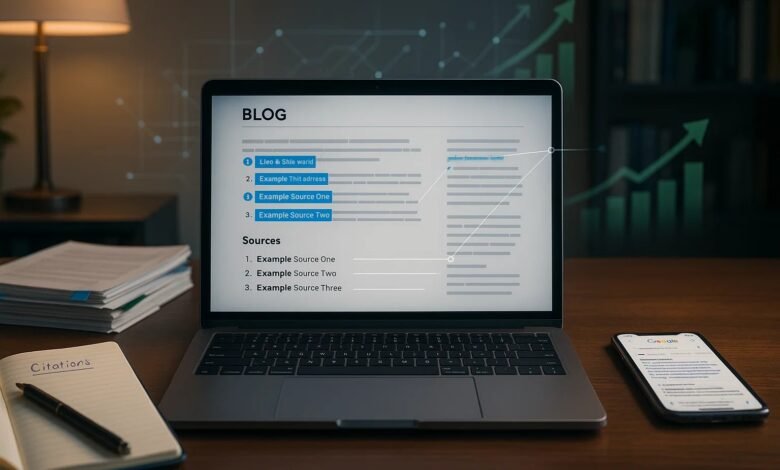
When you write a blog post, you want people to read it. But first, you need Google to show your content in search results. One powerful way to do this is through proper citations. A citation is simply when you mention or link to another source in your content. Think of it like giving credit in a school project. When you cite sources in your blog posts, Google sees your content as more trustworthy and reliable.
The power of citations lies in how they signal to search engines that your information is backed by real facts and research. Websites that include citations and links to authoritative sources tend to rank higher than those that don’t. In this article, we’ll show you exactly how citations improve your SEO rankings, boost reader trust, and help your blog become more visible online.
What Are Citations and Why Do They Matter for SEO?
Understanding Citations in Content
Citations are references to other sources, research, websites, or experts that you include in your content. They’re not just for academic papers anymore. In modern blogging, using citations is one of the best ways to build authority and trust with both your readers and search engines.
There are two main types of citations you’ll encounter:
- Structured citations – These are formal mentions with links to specific sources or websites
- Unstructured citations – These are casual mentions of your source or competitor information without direct links
When you include citations in your blog, you’re basically telling Google, “I did my homework. I read what experts said about this topic, and I’m sharing that information with my readers.” This matters because Google wants to rank content that is well-researched and honest.
How Search Engines View Citations
Search engines like Google, Bing, Yahoo, and Yandex all look for signals that show whether your content is trustworthy. The power of citations comes from the fact that they act as proof that your information is real and verified. When you link to reputable websites, you show search engines that your blog exists within a network of trusted information sources.
According to recent research on citing sources for SEO, well-cited content has a much higher chance of appearing in featured snippets and AI-generated answers. This means your blog could be featured at the very top of search results, getting even more visibility than the top-ranked link.
How Citations Boost Your Blog’s SEO Rankings
Citations Signal Content Quality
Google’s algorithm checks for many things when deciding which blogs to rank. One important signal is whether your content includes citations from authoritative sources. When you cite well-known websites, research papers, or industry experts, Google understands that your content is based on solid information.
Here’s what happens when you use citations properly:
- Google trusts your content more
- Your blog appears more credible to readers
- Search engines see you as part of a larger ecosystem of trusted information
- You’re more likely to appear in featured snippets
- Your content could be cited by AI tools like ChatGPT or Google’s AI Overviews
Increased Visibility Through Featured Snippets
Featured snippets are the special boxes that appear at the top of Google search results. Getting your content into a featured snippet can double or triple your traffic because it appears above the regular search results.
Research shows that content with proper citations is significantly more likely to be selected for featured snippets. This is because Google wants to show information that’s clearly sourced and well-researched. When you cite sources, your content looks more like the type of high-quality information Google wants to feature.
Building Trust Through Transparency
Readers want to know where your information comes from. When you include citations in your blog posts, you’re showing your audience that you’re being transparent and honest. This builds trust, and trust is everything in blogging.
When readers trust your content, several positive things happen:
- They spend more time on your page (Google notices this)
- They’re more likely to share your content
- They come back to your blog for more information
- They might click on your affiliate links or buy your products
All of these actions tell Google that your content is valuable, which helps your rankings improve.
Also Read: How to Improve Brand Visibility Using Offline SEO Strategies
The Connection Between Citations and Domain Authority
What Is Domain Authority?
Domain authority is a score (from 1 to 100) that measures how trusted and important your entire website is. Websites with higher domain authority tend to rank better in search results. You build domain authority over time through quality content, backlinks, and engagement.
Citations Help Build Your Authority
Using citations doesn’t directly add to your domain authority, but it does something equally important. When you cite reputable sources, you show search engines that your website is part of a trusted network. This signals that your blog is serious about providing accurate information.
Additionally, when other websites cite YOUR content (these are called backlinks), your domain authority increases directly. This is why building citation-worthy content is so important. If you create content that experts want to reference, those references become backlinks that boost your authority significantly.
Practical Tips for Using Citations Effectively in Your Blog
How to Cite Sources Properly
Using citations correctly makes a big difference. Here are the best practices:
- Link to the original source – Always link to where you found the information, not to a summary or article that mentioned it. This shows you actually researched the topic.
- Use descriptive anchor text – Instead of “click here,” use text like “according to this study about SEO citations” that tells readers what they’ll find.
- Mix your sources – Don’t cite from the same three websites over and over. Reference different authoritative sites to show you’ve done thorough research.
- Cite recent information – Use sources from the last 1-3 years when possible, especially for topics that change frequently.
- Include both statistics and expert opinions – Combine hard data with quotes from recognized experts to make your content more convincing.
Types of Sources to Cite
Not all citations are equally valuable for your SEO. Focus on citing sources like:
- Government websites (.gov sites) – These are considered highly authoritative
- Academic institutions (.edu sites) – Universities and research centers
- Industry leaders – Well-known companies and brands in your field
- Research studies and whitepapers – Original research published by reputable organizations
- Expert blogs – Blogs written by recognized authorities (check their domain authority first)
Citations vs. Backlinks: What’s the Difference?
Understanding Both Concepts
Citations and backlinks are related but not the same thing. A citation is simply a mention of your source. A backlink is a clickable link. This difference matters for your SEO strategy.
A backlink is a link from another website to your website. It’s like a vote of confidence. When a high-authority website links to your blog, search engines see it as proof that your content is valuable.
A citation in your blog post is when you link to someone else’s content. This helps your readers and signals to search engines that your content is well-researched.
Both are important:
- Backlinks to your site improve your rankings directly
- Citations you include improve your content’s credibility and increase your chances of getting backlinks
Think of it this way: citations are research credits, while backlinks are votes of confidence.
How Citations Lead to Backlinks
Here’s the powerful connection: when you cite sources properly, the people and companies you cite often notice. They might:
- Mention your blog to others
- Link back to your content
- Invite you to collaborate
- Share your content on social media
This cycle of positive attention can naturally lead to more backlinks, which directly boosts your domain authority and rankings.
Citations and AI Search Engines
Why AI Cares About Citations
New AI search engines like ChatGPT, Google’s SGE, and Perplexity are changing how people find information. These systems rely heavily on citations. Recent research found that AI platforms cite an average of six sources per response. This means if your content is cited by AI, it gets shown directly to users asking questions.
Google’s new feature called AI Overviews shows that 82.5% of citations link to deep content pages (pages that aren’t just the homepage). This means comprehensive, well-cited blog posts have a huge advantage.
Optimizing for AI Citations
To get your content cited by AI systems:
- Answer questions thoroughly with multiple perspectives
- Include proper citations to credible sources
- Use clear headings and structured content
- Back up claims with data or expert quotes
- Update your content regularly to keep it current
Common Citation Mistakes to Avoid
Don’t Overdo It
While citations are powerful, too many can make your blog look cluttered and distract from your own thoughts. A good rule is to include 1-3 citations per 500 words of content. Quality matters more than quantity.
Don’t Cite Low-Quality Sources
Citing a random blog or questionable website actually hurts your credibility. Always check the authority of a source before linking to it. You’re essentially endorsing that website, so make sure it’s trustworthy.
Don’t Create Citation Links Just for SEO
Never artificially stuff your blog with citations just to try to trick Google. Search engines can tell the difference between natural, helpful citations and forced linking. Always cite sources because they genuinely support your point.
Don’t Forget to Update Old Citations
If you update old blog posts, check your citations. Remove links to websites that no longer exist or are no longer relevant. Fresh citations signal to Google that your content is current.
Real-World Examples of Citation Success
Example 1: Research-Backed Blog Post
A blog post about SEO that includes links to official Google documentation, studies from institutions like Whitespark, and quotes from recognized SEO experts will rank better than a similar post without these citations. The citations prove the information is current and accurate.
Example 2: News Article Coverage
When news outlets write about topics, they extensively cite sources. This is one reason news websites rank so well for current topics. They’ve demonstrated that using citations is a standard practice for trustworthy content.
Example 3: Featured Snippet Success
Blog posts that appear in Google’s featured snippets almost always include proper citations. These snippets usually feature a direct quote or fact followed by a source reference. This shows that search engines favor well-cited content.
Tools to Help You Build Citations
Research and Citation Tools
Several tools can help you find and organize citations:
- Search Engine Journal – Comprehensive resource for SEO news and research
- Google Scholar – Search for academic papers and research studies
- Industry reports – Look for reports from companies in your field
- HARO (Help A Reporter Out) – Find expert quotes for your blog
- Ahrefs and SEMrush – See which sources top-ranking competitors cite
Citation Management
Tools like Zotero, Mendeley, and EverNote help you organize citations and sources as you research. This makes it easier to cite sources correctly in your blog.
How to Measure the Impact of Citations on Your SEO
What Metrics to Track
Keep an eye on these metrics to see if your citation strategy is working:
- Rankings – Are your blog posts ranking higher for your target keywords?
- Featured snippets – Are you appearing in featured snippets more often?
- Traffic from organic search – Is more traffic coming from search engines?
- Bounce rate – Are readers spending more time on your page?
- Backlinks – Are other sites linking to your content more often?
- Engagement – Are readers clicking citations and exploring sources?
Tools for Tracking
Google Search Console and Google Analytics show how your content performs. SEO tools like Ahrefs, Moz, and SEMrush help you track rankings and backlinks over time.
Building Your Citation Strategy
Step 1: Audit Your Current Citations
Look at your existing blog posts. Which ones have the most citations? Which ones rank the best? This shows you what works.
Step 2: Update Old Posts
Find older posts that need updating. Add fresh citations to recent research and updated statistics. This signals to Google that your content is current.
Step 3: Plan Citations During Content Creation
When you start writing a new blog post, plan which sources you’ll cite from the beginning. Research as you write, and take notes about your sources.
Step 4: Focus on Quality Over Quantity
Cite fewer sources but make sure they’re high-authority. One citation to an official Google blog is worth more than five citations to random websites.
Step 5: Monitor Performance
Track how your content ranks after you add citations. Over time, you’ll see which citation practices work best for your blog.
The Future of Citations in SEO
AI and Citations
As AI becomes more important in search, the power of citations will only grow. AI systems need citations to function properly. They use citations to:
- Verify information
- Give credit to original sources
- Provide transparent answers to users
- Build trust with their users
Blogs that are well-cited today will be in the best position to benefit from AI-driven search in the future.
Voice Search Optimization
Voice search assistants like Alexa and Siri will increasingly rely on cited sources. When you cite reputable sources, your content becomes more likely to be used in voice search responses.
Conclusion
The power of citations is one of the most underutilized SEO strategies available to bloggers. When you cite credible sources, you send a clear signal to Google, Bing, Yahoo, and Yandex that your content is trustworthy, well-researched, and valuable to readers.
Citations boost your chances of appearing in featured snippets, increase reader engagement, build your domain authority over time, and position your blog to thrive in the age of AI search. By implementing a thoughtful citation strategy, using high-quality sources, and avoiding common mistakes, you can significantly improve your blog’s SEO rankings and visibility.
Whether you’re just starting your blog or looking to improve your existing content, remember that using citations properly is not just about following rules. It’s about building genuine trust with both your audience and search engines, which is the foundation of long-term SEO success. Start auditing your current citations today, and watch your blog climb the search rankings as readers and search engines discover that your content is worth citing and sharing with the world.











